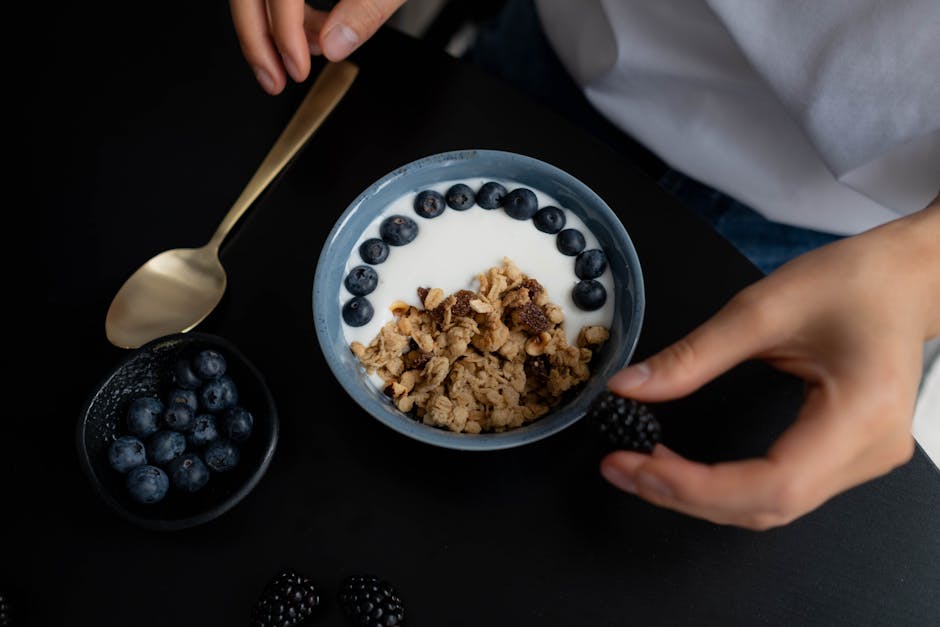Smart nutrition is the cornerstone of optimal health and fitness, shaping not just our physical performance but also our overall well-being. At Fit Food Wisdom, we believe that understanding and applying smart nutrition principles can empower you to reach your health goals, boost energy, and prevent chronic disease. In this comprehensive guide, you’ll discover practical strategies, science-backed tips, and sustainable habits to make smart nutrition a lasting part of your lifestyle.
What is Smart Nutrition? The Foundation of Optimal Health

Photo by Kai-Chieh Chan on Pexels
Smart nutrition is more than just eating the right foods—it’s an intentional, evidence-based approach to fueling your body. It involves choosing foods that provide the right balance of macronutrients (proteins, fats, carbohydrates), micronutrients (vitamins, minerals), and phytonutrients to support your body’s unique needs. By prioritizing nutrient-dense foods and understanding how different nutrients affect your body, you can optimize your physical performance, mental clarity, and long-term health.
Smart nutrition also means listening to your body’s signals, understanding portion sizes, and making choices that align with your personal health goals. It empowers you to navigate the overwhelming world of diets and trends by focusing on sustainable, science-backed principles rather than quick fixes.
At its core, smart nutrition is about building a positive relationship with food. It encourages mindful eating, helps prevent chronic diseases like diabetes and heart disease, and supports healthy weight management. By adopting a smart nutrition mindset, you lay a strong foundation for a vibrant, energetic, and resilient life.
Building Balanced Meals: The Key to Sustained Energy

Creating balanced meals is a fundamental aspect of smart nutrition. A balanced meal provides your body with the right mix of macronutrients and micronutrients, ensuring steady energy levels and optimal bodily function. The classic “plate method” is a practical way to visualize balanced eating: fill half your plate with non-starchy vegetables, a quarter with lean protein, and a quarter with whole grains or starchy vegetables.
Proteins are essential for muscle repair, immune function, and hormone production. Include sources like poultry, fish, legumes, tofu, and eggs. Healthy fats, such as those from avocados, nuts, seeds, and olive oil, support brain health and nutrient absorption. Complex carbohydrates from whole grains, beans, and starchy vegetables provide sustained energy and are rich in fiber, which supports digestion.
Don’t forget the importance of variety. Rotating your protein sources, trying different vegetables, and exploring new whole grains can prevent nutrient gaps and keep meals exciting. Adding a rainbow of colorful produce ensures you get a broad spectrum of vitamins, minerals, and antioxidants to support your immune system and fight inflammation.
Superfoods and Nutrient Density: Maximizing Every Bite

Superfoods are nutrient powerhouses that pack large doses of vitamins, minerals, antioxidants, and other health-promoting compounds into every bite. While there’s no official scientific definition of a “superfood,” certain foods stand out for their exceptional nutrient density and health benefits.
Examples include leafy greens like kale and spinach, berries rich in antioxidants, fatty fish like salmon, nuts and seeds, and fermented foods such as yogurt and kimchi. Incorporating these foods into your diet can support heart health, improve digestion, and enhance your body’s ability to recover from exercise.
To maximize nutrient density, focus on whole, minimally processed foods. Swap refined grains for whole grains, choose fresh or frozen produce over canned, and opt for lean proteins. The goal is to get the most nutrition per calorie, helping you stay full and energized without excess calories.
Remember, superfoods aren’t magic bullets—they work best as part of a balanced, varied diet. By making nutrient-dense foods the foundation of your meals, you can boost your health and get more out of every bite.
Meal Planning and Prep: Setting Yourself Up for Success

Photo by Mikhail Nilov on Pexels
Meal planning and preparation are powerful tools for maintaining smart nutrition habits, especially in today’s busy world. By taking time each week to plan your meals, create a shopping list, and prep ingredients in advance, you reduce decision fatigue and make healthy choices easier.
Start by mapping out your week—consider your schedule, preferences, and nutritional needs. Choose recipes that incorporate a variety of food groups and can be batch-cooked or repurposed for multiple meals. Prepping ingredients like chopped vegetables, cooked grains, and portioned proteins can save time and make assembling balanced meals effortless.
Meal prep doesn’t have to be complicated. Even simple steps like washing produce, marinating proteins, or pre-cooking grains can streamline your week. Store meals in clear containers and label them for easy access. Investing in quality storage containers and a reliable set of kitchen tools can make meal prep more enjoyable and efficient.
Consistency is key. By making meal planning and prep a regular part of your routine, you set yourself up for long-term success and reduce the temptation to rely on less nutritious convenience foods.
Mindful Eating: Cultivating a Healthy Relationship with Food

Photo by Mikhail Nilov on Pexels
Mindful eating is an essential component of smart nutrition. It involves paying attention to your body’s hunger and fullness cues, savoring each bite, and being present during meals. This practice can help you develop a more positive relationship with food, reduce overeating, and enhance your overall satisfaction with meals.
Begin by minimizing distractions during meals—turn off screens, sit at a table, and focus on the flavors, textures, and aromas of your food. Chew slowly and take time to appreciate each bite. Notice how different foods make you feel, both physically and emotionally.
Mindful eating also means letting go of food guilt and embracing balance. All foods can fit into a healthy diet when enjoyed in moderation. By tuning into your body’s needs and honoring your cravings without judgment, you can create a more sustainable and enjoyable approach to nutrition.
Over time, mindful eating can help you recognize patterns, address emotional eating triggers, and make choices that truly nourish your body and mind.
Hydration: The Overlooked Pillar of Nutrition

Photo by Natallia Photo on Pexels
Proper hydration is often overlooked in discussions about nutrition, but it’s vital for every aspect of health and fitness. Water supports digestion, nutrient absorption, temperature regulation, and joint health. Even mild dehydration can lead to fatigue, headaches, and impaired performance.
Aim to drink water consistently throughout the day, adjusting your intake based on activity level, climate, and individual needs. While the classic recommendation is eight 8-ounce glasses per day, your needs may vary. Listen to your body’s thirst cues and monitor the color of your urine—pale yellow typically indicates adequate hydration.
In addition to water, hydrating foods like fruits and vegetables (think cucumbers, watermelon, oranges) can contribute to your daily fluid intake. Limit sugary drinks and excessive caffeine, as they can contribute to dehydration.
Staying well-hydrated not only supports physical performance but also boosts mental clarity, aids in weight management, and helps your body function at its best.
Supplements: When and How to Use Them Wisely

Photo by RDNE Stock project on Pexels
Supplements can play a supportive role in smart nutrition, especially when dietary gaps exist or specific health conditions require targeted nutrients. However, they should never replace a balanced diet of whole foods.
Common supplements include multivitamins, vitamin D, omega-3 fatty acids, and probiotics. Before starting any supplement, consult with a healthcare professional to assess your individual needs and avoid unnecessary or excessive intake.
Quality matters—choose reputable brands that undergo third-party testing for purity and potency. Be cautious of supplements making bold health claims or promising rapid results. Remember, more isn’t always better; excessive intake of certain vitamins and minerals can be harmful.
Ideally, focus on meeting your nutritional needs through food first. Use supplements as a tool to fill specific gaps, not as a shortcut to health.
Creating Sustainable Habits for Lifelong Wellness

Photo by Thought Catalog on Pexels
Lasting health and fitness are built on sustainable habits, not short-term diets or extreme restrictions. Smart nutrition is about making small, consistent changes that add up over time.
Start by setting realistic, specific goals—such as adding one extra serving of vegetables per day or cooking at home three nights a week. Track your progress, celebrate your successes, and be gentle with yourself when setbacks occur.
Surround yourself with a supportive environment. Stock your kitchen with healthy staples, involve friends or family in meal prep, and seek out communities that share your wellness values. Remember that flexibility is key—life is unpredictable, and your nutrition plan should adapt to your needs and circumstances.
By focusing on progress, not perfection, you can create a positive feedback loop that reinforces healthy behaviors and supports lifelong wellness.
Conclusion: Embracing Smart Nutrition for a Healthier Future

Photo by Los Muertos Crew on Pexels
Embracing smart nutrition is a powerful investment in your health, fitness, and quality of life. By understanding the principles of balanced eating, prioritizing nutrient-dense foods, practicing mindful habits, and creating a supportive environment, you can unlock your full potential and enjoy lasting wellness. Remember, small steps lead to big results—start making smarter choices today and let Fit Food Wisdom guide you on your journey to optimal health and fitness.
Sources
- https://www.heymarvelous.com/blog/seo-for-wellness-blog
- https://www.brandsetgrow.com/blog/seo-tips-health-wellness-fitness-brands
- https://roiminds.com/health-and-wellness-blog-for-seo/
- https://www.gethealthie.com/blog/seo-for-medical-practices
- https://www.getweave.com/seo-strategies-wellness/

